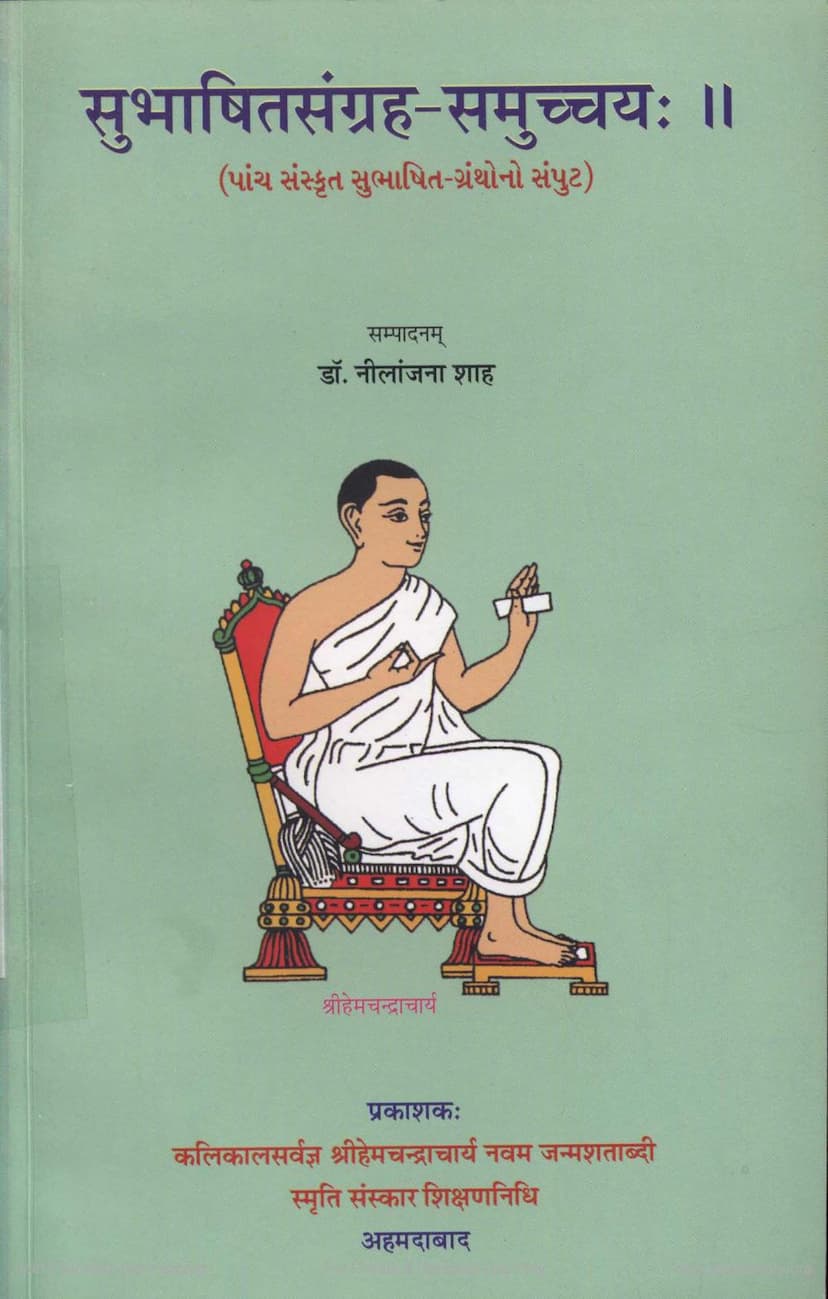SubhashitSangraha Samucchay
Added to library: September 2, 2025

Summary
This document is the Subhashit Sangraha Samucchay, a collection of Sanskrit subhashitas (well-spoken verses) compiled by Dr. Nilanjana Shah and published by the Kalikal Sarvagya Shri Hemchandracharya Navam Janmashatabdi Smruti Sanskar Shikshannidhi, Ahmedabad, in 2007. The book is a compilation of five ancient Sanskrit subhashita collections found on palm-leaf manuscripts.
Here's a breakdown of its content and significance:
Key Aspects of the Book:
- Title: Subhashit Sangraha Samucchay (सुभाषितसंग्रह-समुच्चयः) which translates to "Collection of Subhashita Compendiums."
- Compiler/Editor: Dr. Nilanjana Shah.
- Publisher: Kalikal Sarvagya Shri Hemchandracharya Navam Janmashatabdi Smruti Sanskar Shikshannidhi, Ahmedabad.
- Publication Year: 2007 (V.S. 2063).
- Content: It brings together five previously unpublished Sanskrit subhashita collections found in a palm-leaf manuscript (numbered 264(1)) from the Jain Bhandar in Khambhat. The manuscript is estimated to be from the 14th century CE.
- Significance:
- Preservation of Rare Texts: The primary value of this work lies in its publication of five ancient, previously unedited subhashita collections.
- Jain Contribution: Many of the subhashitas and their compilers are associated with Jain tradition, making it a valuable resource for Jain scholars and enthusiasts.
- Cultural and Literary Insight: Subhashitas often reflect societal norms, ethical values, philosophical ideas, and literary trends of their time. These collections provide a glimpse into such aspects.
- Scholarly Introduction: The book includes a detailed preface and introductions to each of the five collections, discussing their content, significance, and relationship to other known Sanskrit subhashita works.
The Five Collected Subhashita Texts:
The book is organized to present these five distinct collections:
- Suktakavali (सूक्तावली): A collection of 147 verses, starting with an invocation to the Tirthankaras, indicating its Jain origin. It is divided into two sections: Dharmadhikar (verses on Dharma/righteousness) and Kamadhikar (verses on Kama/desire or worldly matters). The Dharmadhikar section particularly emphasizes the rarity and importance of human birth and righteous conduct.
- Bodha Pradipah (बोधप्रदीपः): A collection of 52 verses that serve as a "lamp of knowledge," aiming to guide individuals away from worldly attachment and towards self-realization. The verses often use metaphors to depict the transient nature of life and the dangers of worldly desires. The compiler seems to have a lean towards Shaivism based on the opening verse.
- Subhashita Ratnakosha (सुभाषितरत्नकोशः): This collection, attributed to Mummanideva (or Mummani Deva), contains 197 verses divided into Dharmadhikar and Arthadhikar. Mummanideva is described as a great scholar, a devotee of Shiva, and possibly a royal guru. The collection includes verses on various subjects, often drawing from other classical works. It highlights the aesthetic quality of subhashitas and their use of anyokti (indirect expression or allegory).
- Sukta Sangrahah (सूक्तसंग्रहः): This is a collection of 220 verses, of which 10 are in Prakrit and the rest in Sanskrit. It is noted for its thematic diversity and includes verses on wealth, poverty, charity, education, old age, the householder's life, deities, rebirth, ethical values, practical advice, and Jain doctrines. It also contains a significant section on vegetarian food items and 24 types of grains, with commentary, making it valuable for understanding culinary and religious practices.
- Suktakavali (लघु) (सूक्तावली (लघु)): A shorter collection of 69 verses found at the end of the manuscript, which might have been overlooked by previous catalogers. It also shows Jain influence, with verses praising Jinendra and Jain dharma. It emphasizes the importance of character, wisdom, and living a life of detachment.
Overall Theme and Contribution:
The "Subhashit Sangraha Samucchay" is significant for:
- Academic Value: It makes rare manuscripts accessible to scholars, aiding in the study of Sanskrit literature, ethics, philosophy, and Jain traditions.
- Ethical Guidance: The subhashitas collectively offer guidance on righteous living, virtue, detachment from worldly pleasures, and the pursuit of spiritual knowledge.
- Literary Merit: The verses are often concise, elegant, and insightful, showcasing the art of "subhashita" composition.
In essence, this book is a scholarly endeavor to preserve and present valuable ancient Sanskrit literature, particularly highlighting the rich tradition of subhashitas within Jainism.